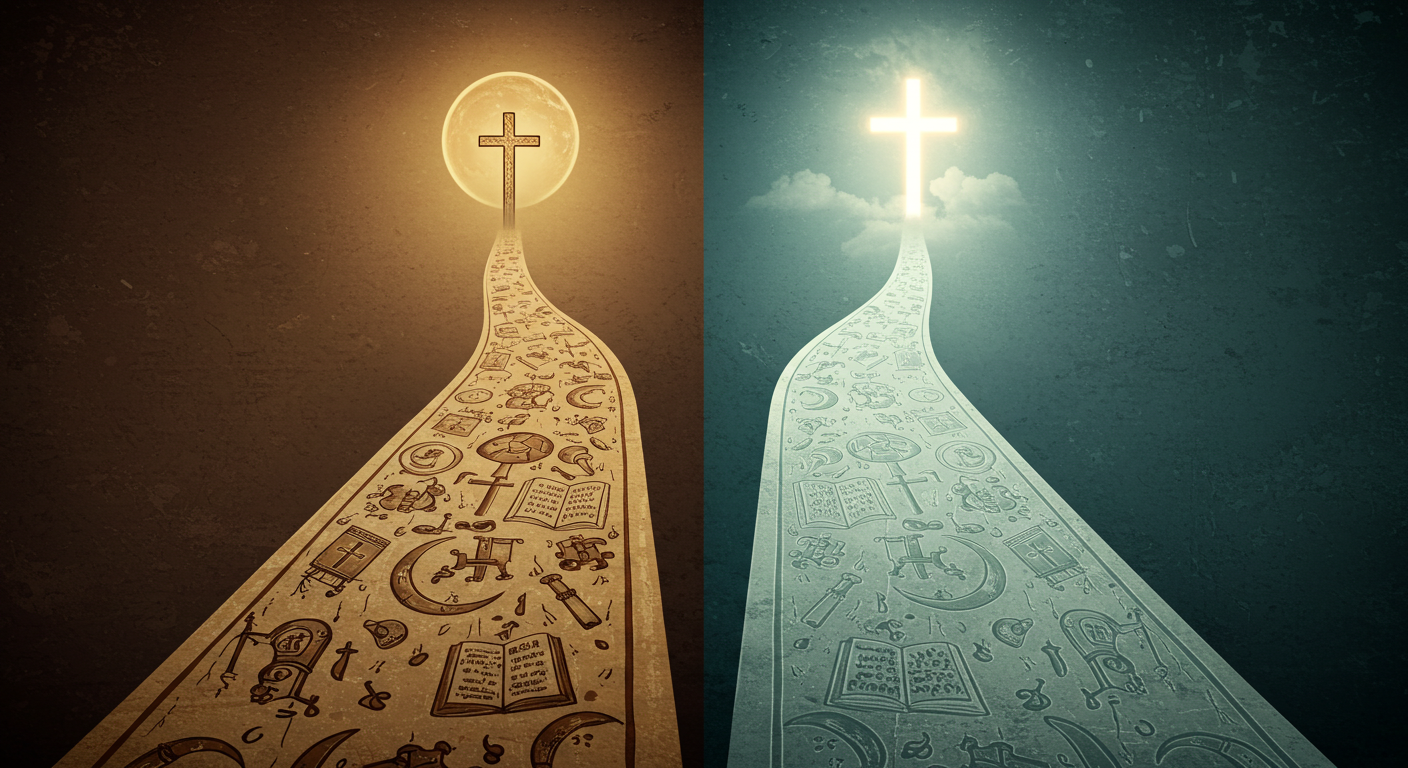The Difference Between Religion And Being Born Again
You’ve probably heard conversations, sermons, or articles that talk about “religion” and “being born again” like they’re two sides of the same coin — or sometimes as opposites. The difference between religion and born again is more than just semantics. It’s about where life begins: from what you do or who you are in Christ. In this article, you’ll explore how religion often emphasizes external practices, while being born again emphasizes an inward, spiritual transformation through Jesus Christ. You’ll see biblical proof, practical implications, and honest guidance for distinguishing ritual from real rebirth.
Why this distinction matters to you
Knowing the difference between religion and being born again matters because it changes everything about how you relate to God, others, and yourself. Religion can make you feel you’re acceptable based on performance. Being born again means your identity and standing are rooted in Christ. That shift affects your peace, purpose, and priorities. When you understand the difference between religion and born again, you’ll be able to examine your spiritual life honestly — not just what you do on Sundays, but what’s going on inside your heart.
What people usually mean by “religion”
When people talk about religion, they usually mean a system of beliefs and practices that define how to worship, behave, and belong. Religion includes rituals, moral codes, liturgies, and institutions. You might find comfort and structure in religious practices — that’s not inherently wrong — but religion tends to emphasize observable compliance: prayers said, rules kept, rituals performed. Those external markers can become a fence that keeps you focused outward instead of upward.
Religion’s strengths and limits
Religion can give order, community, and moral guidance. It can pass on wisdom, shape cultures, and help people live disciplined lives. But its limit appears when the focus shifts to performance as the basis for acceptance. Jesus warned about this tendency when He confronted religious leaders who prized outward appearances over inward purity. Read His words to the Pharisees in Matthew 23:27-28: their religion looked beautiful outside, but was hollow inside.
What “born again” means in scripture
Being born again is a spiritual rebirth that Jesus described to Nicodemus. It’s not a metaphor for trying harder; it’s a supernatural work of God that changes your nature. Jesus told Nicodemus bluntly, “I tell you the truth, no one can see the kingdom of God unless they are born again” (John 3:3). In subsequent verses, He explains that the birth of the Spirit is necessary: “no one can enter the kingdom of God unless they are born of water and the Spirit” (John 3:5-7). That new birth is the pivot from religion-as-doing to life-in-Christ-as-being.
New identity, new life
When you’re born again, Scripture says you become a new creation: “Therefore, if anyone is in Christ, the new creation has come: the old has gone, the new is here!” (2 Corinthians 5:17). That’s not a cosmetic makeover; it’s a transformation of identity. Your legal standing before God shifts because of what Jesus has done, not because of what you’ve produced. That reality reshapes motivation: you serve out of gratitude rather than earning favor.
Grace versus works: the heart of the difference
At the core of the difference between religion and born again is the gospel tension between grace and works. Religion too often emphasizes works — what you must do to be accepted. The Bible insists that salvation is by grace through faith, not by works, so that no one can boast. Consider Ephesians 2:8-9: “For it is by grace you have been saved, through faith… not by works.” That doesn’t mean works are irrelevant; it means they are the fruit of salvation, not the root.
Don’t misunderstand works
You might be thinking, “So good works don’t matter?” That’s not what Scripture teaches. James makes it clear that genuine faith produces actions: faith without works is dead (James 2:14-26). The difference is the source: religion tries to derive acceptance from works; being born again derives works from God’s work in you.
External practices vs. inward transformation
Religion often measures spirituality by externals — attendance, ritual participation, tithes, and ethical behavior. Those things can be meaningful and important. But when they become the end rather than the means, they risk becoming a veneer over an unchanged heart. Jesus exposed this when He criticized religious leaders whose righteousness was superficial: “Outside you appear to people as righteous… but inside you are full of hypocrisy and wickedness” (Matthew 23:27-28).
The inward reality that marks a new birth
Being born again isn’t primarily about rituals; it’s about the Spirit’s work transforming your heart. The New Testament describes this inward transformation in multiple ways: new creation (2 Corinthians 5:17), union with Christ (Romans 6:4), and ongoing sanctification. That inner reality will change how you think, desire, and act over time.
The legal standing shift: justified by faith
Religion often works from the premise that you must be righteous before God through obedience. The gospel flips that: you are justified — declared righteous — through faith in Christ. Paul argues this at length to show the difference between living under law and living under grace. “A person is not justified by the works of the law, but by faith in Jesus Christ” (Galatians 2:16). When you’re born again, your righteousness before God is not your achievement; it is Christ’s gift credited to you.
How assurance changes
This legal shift provides assurance: your relationship with God doesn’t rest on your fluctuating performance. When you understand the difference between religion and being born again, you realize that assurance comes from Christ’s finished work rather than your next litany of good deeds. That doesn’t license moral laxity; it frees you to pursue holiness out of love rather than fear.

How being born again changes behavior — not by coercion but by nature
Transformation after a new birth often looks like moral improvement, compassion, and sacrificial love. But you don’t change primarily because you try harder; you change because the Spirit is at work in you. Paul describes Christ’s resurrection life operating in believers: “We were therefore buried with him through baptism into death… just as Christ was raised from the dead through the glory of the Father, we too may live a new life” (Romans 6:4). What follows is a natural outworking of that new life.
The fruit of the Spirit as a sign
One way you can recognize inward change is by the fruit of the Spirit. These are not tasks on a to-do list; they are qualities that grow as you abide in Christ: love, joy, peace, patience, kindness, goodness, faithfulness, gentleness, self-control (Galatians 5:22-23). If you’re concerned about whether you’re truly born again, assessing the trajectory of these characteristics in your life is more reliable than counting religious activities.
Biblical examples that clarify the difference
Scripture gives you clear narratives that contrast religious life with genuine rebirth.
- Nicodemus: A religious leader who visited Jesus to learn more but didn’t understand spiritual rebirth until Jesus explained it. See John 3:1-21. The encounter shows you can be deeply religious and still lack the new birth.
- Zacchaeus: A man who was despised for his profession but, after meeting Jesus, demonstrated new-life repentance by restoring wrongs (Luke 19:1-10). His story shows how an encounter with Christ produces visible change.
- Apostle Paul: He moved from religious zeal for the law to being transformed by Christ. He described himself as a new creation in 2 Corinthians 5:17, demonstrating a radical identity shift.
Common misconceptions you need to avoid
There are several misconceptions about the difference between religion and born again you should be aware of:
- Misconception: Being religious equals being spiritual. You can attend everything and still lack the new birth. Jesus warned about outer forms without inner life (Matthew 23:27-28).
- Misconception: Born again means instant perfection. Being born again initiates a lifelong process of growth; it doesn’t make you morally flawless overnight.
- Misconception: If you have doubts, you’re not born again. Doubts can happen; what matters is the evidence of Christ’s work in you and your turning to Him. Assurance is found in faith, not in flawless feelings.
- Misconception: Religion is always bad. Religion can help structure a faithful life, but it becomes dangerous when it replaces reliance on Christ.
Practical signs you might be born again
If you’re wondering whether you’re born again, Scripture points to practical signs that indicate genuine transformation. These aren’t a checklist for salvation, but they’re helpful indicators that the Spirit is at work.
- A sincere repentance: You find yourself turning away from sin rather than just condemning certain actions.
- Trust in Christ alone for salvation: Your confidence rests in Jesus’ sacrifice, not your performance (Romans 10:9-10).
- A desire for holiness: Not legalism, but heartfelt longing to honor God that shapes choices and priorities.
- Growth in the fruit of the Spirit: Love, patience, self-control, and the like begin to increase over time (Galatians 5:22-23).
- Joyful obedience: You find yourself wanting to obey God out of love, not to earn favor. Obedience is the evidence of relationship, not the currency that buys it.
- Sacrificial love for others: You begin to care for people beyond yourself, reflecting the heart of Christ.
If you’re looking for a clear conversion moment, Acts shows that repentance and baptism often accompany new faith. Peter told the crowd on Pentecost to “repent and be baptized… for the forgiveness of your sins” (Acts 2:38). That pattern doesn’t make the ritual the cause of salvation, but it often marks the outward step of an inward reality.
How religious systems can be repurposed for life in Christ
You might belong to religious traditions that carry meaningful practices: prayer rhythms, liturgies, sacred seasons, community disciplines. These can be valuable when they serve to point you to Christ rather than to yourself. The difference between religion and born again is not necessarily that you abandon structure; it’s that the structure becomes a means of grace rather than a badge of merit. You can embrace disciplines that foster communion with God while resisting pride and performance.
Tips for healthy practice
- Use rituals as reminders, not replacements, of reality. Let prayer and Scripture draw you into relationship, not simply check boxes.
- Evaluate motives: Are you doing spiritual activities to be seen, or because you love Jesus? Jesus cautioned against prayer and fasting for public applause (Matthew 6).
- Cultivate wonder: The new birth is a marvel. Let humility and gratitude shape your practices.
How to lovingly engage those who seem “religious”
If someone appears religious without signs of new-life transformation, your posture matters. You’re called to love, not to judge. Jesus engaged religious people with truth and compassion. You should seek to:
- Listen and ask questions rather than condemn.
- Share your testimony of how the Spirit changed you—stories are persuasive.
- Demonstrate kindness and service that mirror Christ’s priorities.
Jesus warned that some will do religious things and still miss true relationship: “Not everyone who says to me, ‘Lord, Lord,’ will enter the kingdom of heaven” (Matthew 7:21-23). Your role is to point others to the living relationship Jesus offers, not just to more rules.
Frequently asked questions you might have
You probably have follow-up questions. Let’s address some common ones honestly and biblically.
- Can you be both religious and born again? Yes. Some people who are born again still participate in religious traditions. The key is the source of your life: is it Christ or performance?
- If I pray and do good deeds, am I fine? Those practices point in the right direction, but without trust in Christ and evidence of inward transformation, they are insufficient for salvation. Scripture stresses faith in Christ as the means of justification (Ephesians 2:8-9).
- What about moral people who aren’t religious? Moral behavior doesn’t automatically equal being born again. The new birth transforms motives and desires, not just external actions.
- How can I be sure I’m born again? Look for the signs we discussed: repentance, trust in Christ, growth in the fruit of the Spirit, and new desires consistent with God’s will. If you’re uncertain, pray and talk with a mature believer or pastor about your doubts and experiences.
What to do if you want to be born again
If you sense a need for new life, the Bible gives clear steps rooted in faith and repentance. Paul summarizes the path to salvation in plain terms: “If you declare with your mouth, ‘Jesus is Lord,’ and believe in your heart that God raised him from the dead, you will be saved” (Romans 10:9-10). That faith is accompanied by turning from sin (repentance) and trusting Christ alone.
You might also take an outward step of faith like baptism, which Scripture often associates with new beginnings and the public confession of faith (Acts 2:38; Romans 6:4). Baptism symbolizes union with Christ in death and resurrection, a tangible sign of the inward reality.
Living out the difference daily
Understanding the difference between religion and born again should change how you live daily. You’ll begin reorienting practices to serve transformation, not appearance. That means daily dependence on Scripture, prayer, fellowship, and obedience — not as burdens, but as life-sustaining rhythms. Paul encouraged believers to live out their union with Christ daily, considering themselves dead to sin and alive to God (Romans 6:4).
Community matters
You don’t grow in isolation. True new life flourishes in community with other believers who encourage, correct, and pray for you. Religion can sometimes isolate or judge; the church that reflects being born again will be a place of grace and truth together.
Practical next steps you can take today
If you want to move from religion to a living relationship or deepen the life you already have in Christ, consider these practical next steps:
- Read and meditate on the gospel accounts of Jesus. Let them shape your view of God.
- Confess and repent of any reliance on works for acceptance. Ask God to reveal where you’re seeking approval apart from Him.
- Seek fellowship with mature believers who model Spirit-led life.
- Pray honestly: tell God your doubts and your desire for real life.
- If you haven’t trusted Christ, pray in simple faith, confessing Jesus as Lord and believing in His resurrection (Romans 10:9-10).
A short bullet list keeps these action items clear:
- Spend time in the Gospels.
- Pray for new birth if needed.
- Talk with a trusted Christian.
- Consider baptism as a step of obedience.
Final reflections: what you should take away
The difference between religion and born again is not about throwing away meaningful practices or being anti-structure. It’s about rooting your life in a relationship with Christ that produces genuine transformation from the inside out. Religion tends to focus on doing; born again life is about who you are because of what Jesus has done in you. The evidence of new birth will be faith that trusts Christ’s work, repentance, the fruit of the Spirit, and a lifelong process of becoming more like Jesus. If you want to explore this further, read Jesus’ conversation with Nicodemus (John 3:1-21) and pray for clarity and faith.
Explore More
For further reading and encouragement, check out these posts:
👉 7 Bible Verses About Faith in Hard Times
👉 Job’s Faith: What We Can Learn From His Trials
👉 How To Trust God When Everything Falls Apart
👉 Why God Allows Suffering – A Biblical Perspective
👉 Faith Over Fear: How To Stand Strong In Uncertain Seasons
👉 How To Encourage Someone Struggling With Their Faith
👉 5 Prayers for Strength When You’re Feeling Weak

📘 Jesus and the Woman Caught in Adultery – Grace and Mercy Over Judgement
A powerful retelling of John 8:1-11. This book brings to life the depth of forgiveness, mercy, and God’s unwavering love.
👉 Check it now on Amazon
As a ClickBank & Amazon Affiliate, I earn from qualifying purchases.
Acknowledgment: All Bible verses referenced in this article were accessed via Bible Gateway (or Bible Hub).
“Want to explore more? Check out our latest post on Why Jesus? and discover the life-changing truth of the Gospel!”






